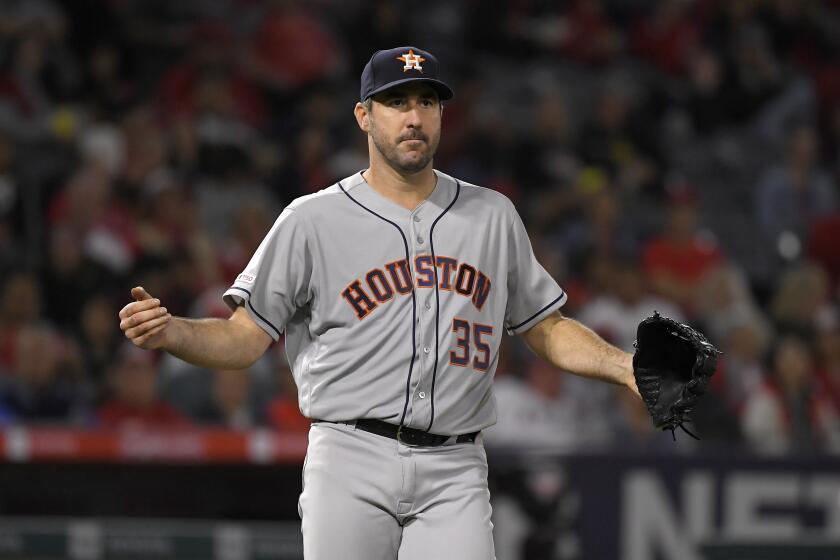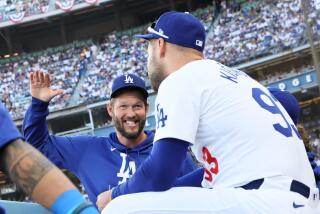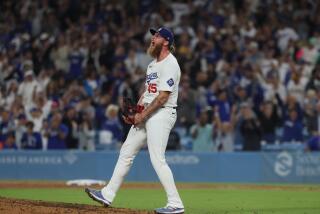Daniel Hudson went from Dodgers’ and Angels’ castoff to Nationals’ closer
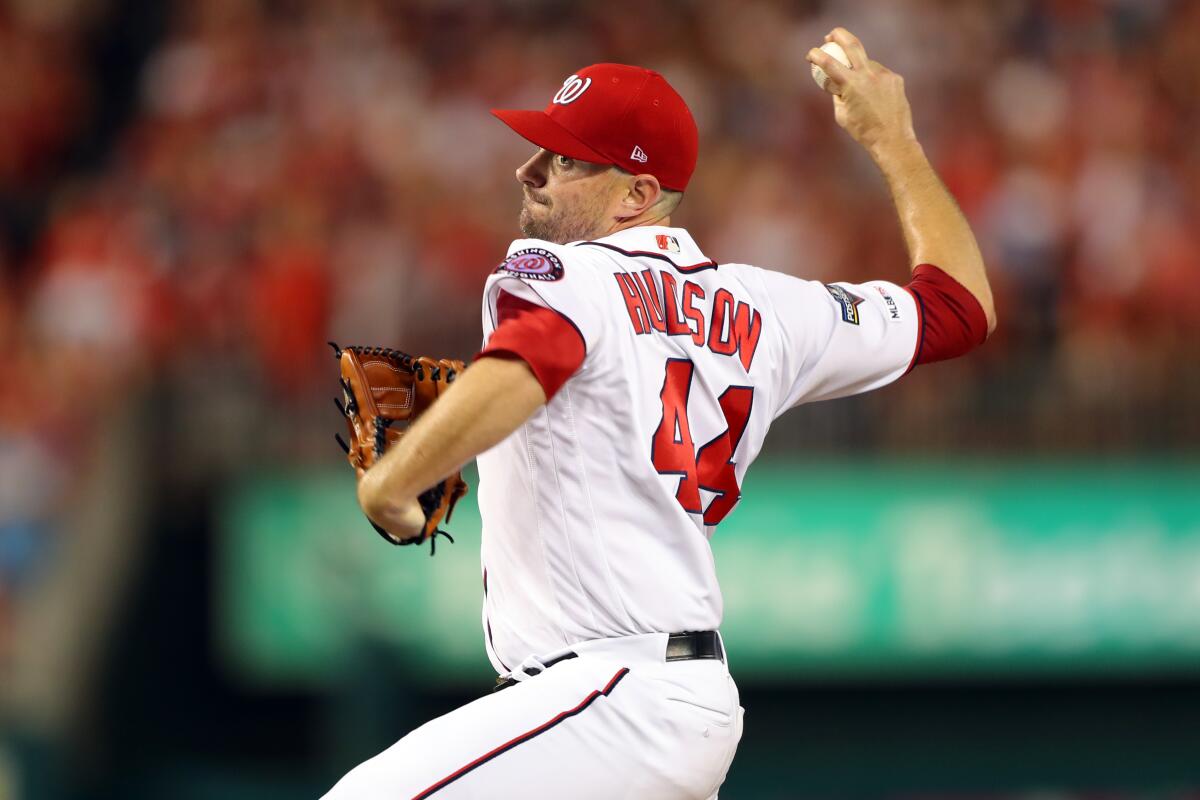
- Share via
WASHINGTON, D.C. — It’s a bit of a head-scratcher, Daniel Hudson admits, his transformation from a struggling reliever cut by the Angels in spring training to co-closer for the National League Division Series-bound Washington Nationals. It’s as surprising to the veteran right-hander as it is to everyone else.
“I’m still trying to figure it out, to be honest,” said Hudson, who secured the final three outs of a dramatic 4-3 come-from-behind win over the Milwaukee Brewers in Tuesday night’s NL wild-card game. “It’s kind of crazy how it worked out.”
Hudson, 32, was unemployed all winter before signing a minor league deal with the Angels on Feb. 13. He was out of work again five weeks later, the Angels releasing him after seven shaky spring outings in which he had a 6.75 ERA and gave up three homers in 6 2/3 innings.
The Toronto Blue Jays threw Hudson a lifeline, signing him to a major league deal the day after the Angels let him go. Hudson shook off a sluggish April and worked his way toward the back of the bullpen by June, going 6-3 with a 3.00 ERA, two saves and eight holds in 45 games.
The Nationals, in desperate need of bolstering one of baseball’s worst bullpens, acquired Hudson in a July 31 trade-deadline deal for minor league pitcher Kyle Johnston. Hudson went 3-0 with a 1.44 ERA, six saves and three holds in 24 games for his new club, striking out 23 and walking four in 25 innings.
“He’s meant a lot to our bullpen, especially with the struggles that [closer Sean Doolittle] had,” Nationals manager Davey Martinez said. “All of a sudden, he stepped up and started closing games for us. He’s kept that bullpen together.”
Hudson, a two-time Tommy John surgery survivor, took the mound in the ninth inning Tuesday night after the Nationals rallied for three eighth-inning runs — two scoring on Juan Soto’s bases-loaded single and one on right fielder Trent Grisham’s fielding error — to turn a 3-1 deficit into a 4-3 lead.
His adrenaline-fueled fastball touching 98 mph and a frenzied Nationals Park crowd hanging on his every pitch, Hudson recorded his first playoff save to close the franchise’s first elimination-game win since it moved from Montreal in 2005.
Justin Verlander, Gerrit Cole and Zack Greinke give the Astros the edge in MLB playoffs, but Dodgers Clayton Kershaw, Hyun-Jin Ryu and Walker Buehler aren’t far behind.
Hudson struck out Eric Thames swinging at a 98-mph fastball for the first out. Lorenzo Cain singled to center field, but Hudson got Orlando Arcia to pop out to the catcher and Ben Gamel to fly to deep center, sparking an emotional on-field celebration as fireworks exploded above the stadium.
“That was unlike anything I’ve ever experienced before — it was an absolute madhouse,” Hudson said of being on the mound for the final out. “That was awesome. So much fun.”
Did it make the grueling rehabilitations from two major elbow surgeries worth it?
“Oh, yeah, absolutely,” Hudson said. “Man, this is what we play for. This is one of the reasons I did it a second time, to be in this position, to be able to help a team win, to get to the playoffs and to pitch in the playoffs.”
And for that, Hudson felt gratitude, not ill will, toward the eventual 90-loss team that released him last spring.
“I didn’t have a job on Feb. 12, and I got a minor league offer from the Angels,” Hudson said. “I felt like I was ready to go, but I didn’t pitch well enough to make the team.”
Hudson has pitched for six teams in 10 big league seasons, spending his first three years as a starter. He went 3-2 with a 4.11 ERA last season for the Dodgers in 39 relief appearances and one start, but did not pitch during the postseason. This spring was the first time Hudson felt pressured to make a team, and he did not respond well.
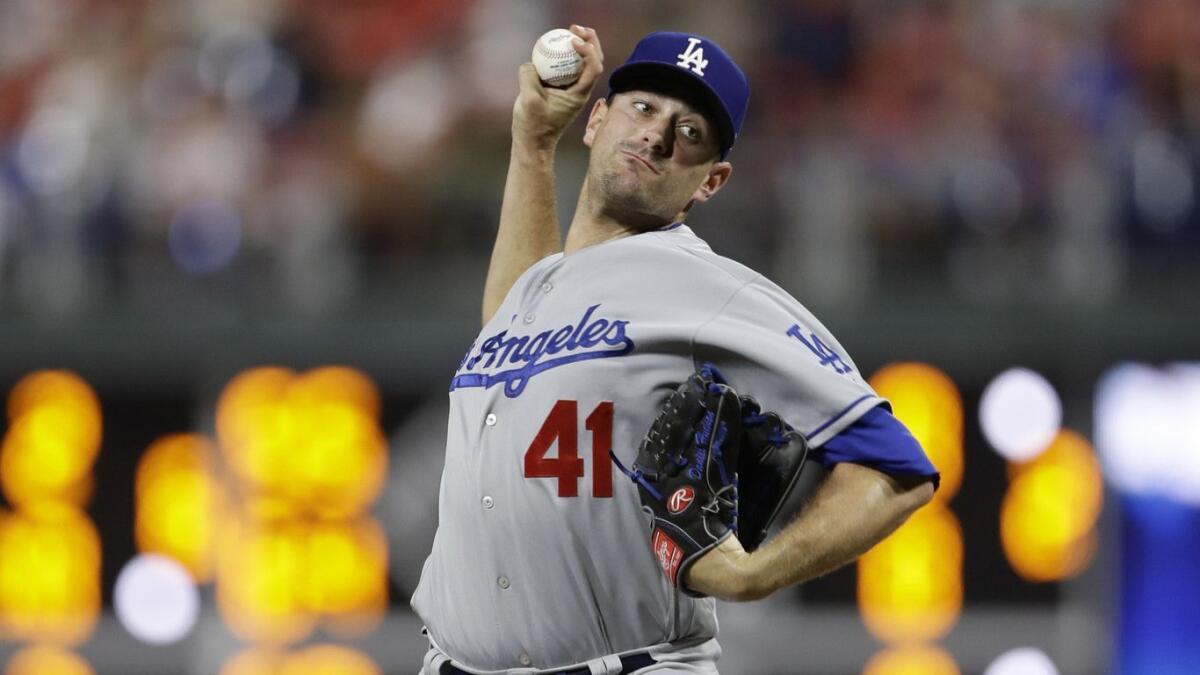
“It’s a different situation going into camp on a minor league deal,” Hudson said. “You have to get ready too soon, and then every game you’re trying to make the team. It’s a spring training game, but it feels like a playoff game.
“You have to have your best stuff every single time, and if you don’t have it in March . . . it’s funny, people talk about small sample size all the time, but teams are picked in March based off seven spring training outings.”
Toronto pitching coach Pete Walker and bullpen coach Matt Buschmann suggested slight mechanical tweaks in Hudson’s delivery so he would use his back side more and not rely on his arm.
Hudson developed a routine where every Tuesday and Friday, regardless of his usage during the week, he threw off a bullpen mound with a Rapsodo machine tracking the velocity, spin rate, tilt axis and break of his pitches.
“We called it research and development,” Hudson said. “We’d get off the mound and throw 10-15 pitches to really reinforce the stuff we had been working on and try to iron out stuff mechanically.”
The adjustments improved the velocity and spin rate of Hudson’s fastball and slider. Hudson started throwing more high-leverage innings, and when Blue Jays closer Ken Giles suffered an elbow injury in July, Hudson took over as closer.
That caught the eye of Nationals general manager Mike Rizzo, whose team rebounded from a 19-31 start to move into playoff contention but needed to upgrade a bullpen that finished with a 5.66 ERA, the worst of any playoff team ever. Hudson has been a perfect fit for the Nationals so far.
“He’s a relentless guy,” Rizzo said. “He pounds the strike zone, and he’s got good stuff. He’s very confident, and he’s pitched a lot of big innings for us.”
The fact that Hudson came back from Tommy John surgery twice told Rizzo plenty about Hudson’s character and determination.
“There’s no doubt about it,” Rizzo said. “You could tell by the way he handles himself in the clubhouse and between the lines that he’s not afraid. He comes right at you, and that’s the type of guy we were looking for.”

Los Angeles Times sportswriter Jorge Castillo and columnist Dylan Hernandez breakdown the National League Division Series between the Los Angeles Dodgers and the Washington Nationals.
More to Read
Are you a true-blue fan?
Get our Dodgers Dugout newsletter for insights, news and much more.
You may occasionally receive promotional content from the Los Angeles Times.

